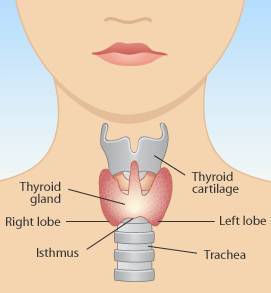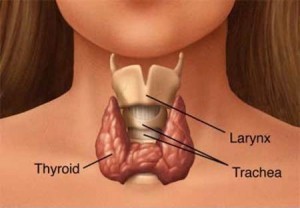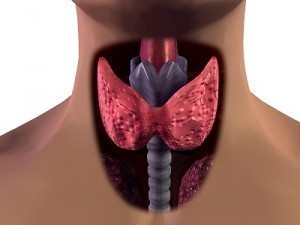Graves’ Disease
Graves’ disease is an autoimmune disease. In other words, the immune system of the body begins to affect its own cells and tissues and leads to an aberrant immune response. In the case of Graves’ disease, the thyroid gets affected. The thyroid will become overactive and will display the associated symptoms of hyperthyroidism. It may cause the eyes to bulge and may also affect other bodily systems inclusive of the heart, skin, circulatory and nervous system. A number of other complications can be triggered off due to Graves’ disease that can affect the quality of life of the patient.
Graves’ Disease has been known to affect the female population more often than the male population. Hereditary factors also play an important part in the incidence of the disease. It is said that if one twin develops the condition the other is twenty-five percent more likely to be affected by the disease.
Apart from studying the symptoms of the patient, a thyroid hormone test will also be done in order to confirm the diagnosis as well as to assess the most effective treatment option, suitable for the patient.
Causes of Graves’ Disease
Graves’ disease could be caused due to hereditary factors. It may also stem from physical or emotional stress or be caused due to an infection. Graves’ disease is a condition that is caused by the failure of the immune system to generate antibodies to protect and fight against foreign invaders such as viruses and bacteria. What happens instead is that, the immune system begins to fight its own cells and tissues and attaches itself to the surface of thyroid cells. As a consequence, excessive secretion causes the thyroid gland to swell and become enlarged. The thyroid hormone levels in the blood increase, leading to hyperthyroidism. The exact cause or reason for autoimmune response is unknown. Some factors that are believed to contribute towards the development of this condition include genetic as well as environmental factors. As mentioned earlier, hereditary issues, infections, stress and toxins are a few possible reasons that may lead to this disease.
Symptoms of Graves’ Disease
The symptoms of Graves’ disease may be numerous. The following list includes some of these symptoms.
- enlargement of the thyroid (goiter)
- palpitations or increase in the heart rate
- increase in blood pressure levels
- heat intolerance
- pronounced sensitivity to light
- an increase in perspiration
- an increase in appetite
- unexplained weight loss
- difficulty in breathing or shortness of breath
- inability to fall asleep
- reduction in sex drive
- muscle weakness
- extreme tiredness or fatigue
- protrusion of the eyeballs
- having double vision
- swollen eyes or eyelids that may be red, increased tearing
- experiencing eye pain which may often feel like there is sand in the eye
- easily broken or brittle nails
- being irritable
- being unable to focus for long periods
- restlessness
- having abnormal enlargement of the breasts (seen in men)
- having a rash that appears lumpy and reddish on the lower part of the legs
- diarrhoea or increased bowel movements
- panic attacks
- an inability to conceive or having frequent miscarriages
- not menstruating or having irregular periods
Treatment of Graves’ Disease
The Treatment options for Graves’ disease include:
use of antithyroid drugs: Antithyroid drugs such as methimazole and propylthiouracil maybe prescribed in order to decrease the production of the thyroid hormone. Treatment with antithyroid drugs may be given for up to two years to decrease the chances of the condition returning. If the treatment is not applied for an adequate period it may not be successful. An unfavourable side effect of using antithyroid drugs is the possible critical reduction of white blood cells that may lead to death. In the United States, it is customary to use radioiodine while in most other places in the world antithyroid drugs are the preferred method of treatment.
Thyroidectomy: Thyroidectomy refers to a surgical procedure where the whole or part of the thyroid gland is removed. Before doing a thyroidectomy, measures will be taken to reduce the chance of complications because of the danger associated with operating on thyroid patients. Therefore, antithyroid drugs will be administered prior to performing surgery.
radioactive iodine: Radioactive iodine therapy is not a feasible option for women who are pregnant because the radiation can affect the developing foetus adversely. When antithyroid drugs fail to make an impact, radioactive iodine therapy maybe employed by the doctors to treat this condition. The patient is given a glass of water or a drink or a capsule containing radioactive iodine. This is rapidly absorbed by the overactive thyroid cells and the radiation destroys them, resulting in lesser thyroid hormones being produced.
After a patient undergoes surgery where the thyroid gland has been partially or wholly removes, he / she will have to take replacement thyroid hormones for the rest of his / her life.




